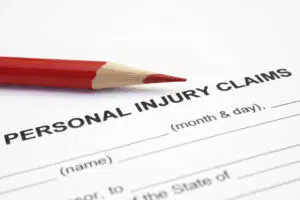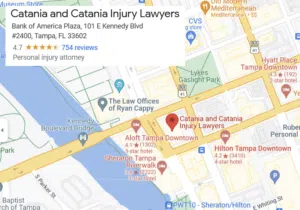
If someone injures you through their misconduct, you may have a personal injury claim or lawsuit. This misconduct could be anything from negligence to intentional wrongdoing. Personal injury law is the state’s way of providing injury victims with fair compensation. A personal injury case arises when an injured person attempts to enforce their right to compensation against the at-fault party.
Table of Contents
Types of Personal Injury Claims

The following is a list of the most common types of personal injury claims:
- Negligence claims, including claims arising from “gross” negligence, which is an extreme form of negligence
- Intentional misconduct claims arising from an assault or a road rage incident, for example
- Vicarious liability claims, where one party bears liability for damages caused by another party (e.g., employer liability for employee misconduct)
- Strict liability claims, such as product liability claims, which do not require proof of fault
Among these, negligence is the most common basis of personal injury claims.
What are the Elements of a Personal Injury Claim?
Personal injury claims based on negligence include four legal elements that you must prove to win: duty, breach of duty, causation, and damages.
- Duty: The defendant must have owed the victim a duty of care. For example, a driver must drive carefully, and a surgeon must operate competently.
- Breach of Duty: The defendant must have failed to meet their duty of care, either by acting carelessly or by failing to act when action was required.
- Causation: The defendant’s breach of duty must have directly caused the victim’s injuries, and they must have been a foreseeable result of the defendant’s breach of duty.
- Damages: The victim must have suffered damages (medical bills, etc.).
Some types of personal injury cases, such as product liability claims arising from strict liability, include elements that differ from those presented above.
What Kinds of Damages Can You Claim in a Personal Injury Case?
The types of damages that an injured victim might claim include:
- Past, present, and future medical expenses
- Past, present, and future lost earnings or occupational disability
- Non-economic damages, such as pain and suffering and mental anguish
- Out-of-pocket expenses, such as child care while you were bedridden
In rare cases, Florida courts will add punitive damages to the above-listed damages. These damages are intended to punish the defendant for gross negligence or intentional misconduct.
What is Comparative Fault?
Florida’s “pure comparative fault” statute distributes liability when more than one party to an accident is at fault. For example, in a car accident lawsuit, both the defendant and the injured victim might share the blame.
Following is an example of the way that Florida courts calculate relative liability when two parties are at fault:
- Calculate the victim’s damages: $20,000, for example.
- Calculate the parties’ relative percentages of fault: 65% for the defendant, for example, and 35% for the injured victim.
- Subtract the victim’s percentage of fault from their awarded damages: [$20,000 – (35% X $20,000)] = ($20,000 – $7,000) = $13,000.
- Assess the remaining damages ($13,000) against the defendant.
The calculations get more complicated if more than two parties are at fault or if more than one party suffered damages.
How Do Insurance Policies Affect a Personal Injury Claim?
Typically, an insurance company pays the claim if the policy covers it. However, insurance coverage has limits, and insurance companies won’t pay any claim amount that exceeds insurance coverage limits. In that case, you may have to file a lawsuit against the at-fault party or other responsible third parties to recover damages exceeding the policy limits.
If the defendant cannot afford to pay the remainder, you could be out of luck. It’s vital to speak with a personal injury lawyer so that they can examine your claim from all angles and get you the maximum compensation in your case.
Settlement vs. Litigation in a Personal Injury Case
Almost all claimants prefer settlement over litigation because it’s quicker and less expensive. In many cases, what actually happens is a little bit of both. Your lawyer may need to file a lawsuit for tactical reasons. That doesn’t mean you will necessarily go to trial. You can still settle your claim before trial, and most people do.
How Does the Statute of Limitations Work in Florida?
The Florida personal injury statute of limitations is two years, with some exceptions. That means you have two years from the date of the accident to file a lawsuit. If the accident was fatal, you only have two years to file a wrongful death claim.
If you miss the statute of limitations deadline, you’ll be barred from recovering compensation for your injuries.
How Do You File a Lawsuit in Florida?
To file a lawsuit, you need to complete the following preliminary steps:
- File a Complaint. This is a formal legal document that must be drafted very carefully.
- Pay the filing fee.
- Have a third party (usually a process server) deliver the summons and a copy of the Complaint to the defendant.
Completing these steps on time is enough to meet the statute of limitations deadline.
What Happens After You File a Lawsuit?
Here is a brief summary of what happens after the court accepts your lawsuit:
- The defendant files an Answer to your Complaint.
- Both sides demand evidence from each other (testimony, interrogatories, Requests for Evidence, and Requests for Admissions) during the pre-trial discovery period. The court can compel a party to comply with another party’s request.
- The court will encourage the parties to negotiate or accept third-party mediation to settle their dispute.
- If the parties cannot reach a settlement, the court will hold a trial to resolve the matter.
- A dissatisfied party can appeal but must have grounds for appeal. You cannot appeal a settlement.
- The plaintiff can institute a collection action if the defendant refuses to pay a judgment or settlement.
Most cases settle without the need for court intervention.
How Much Does it Cost to Hire a Personal Injury Lawyer?
Personal injury lawyers typically work on a contingency fee basis. That means the legal fee is calculated as a percentage of the amount you win – meaning you only pay legal fees if you win. Otherwise, their representation is free of charge.
Contact a Tampa Personal Injury Lawyer for Help With Your Personal Injury Case
If you have suffered a physical injury in an accident due to someone else’s acts or omissions, you may be entitled to file a personal injury claim. If you are not sure whether you have a valid claim, contact an experienced Tampa personal injury lawyer for a free consultation to discuss your circumstances.




